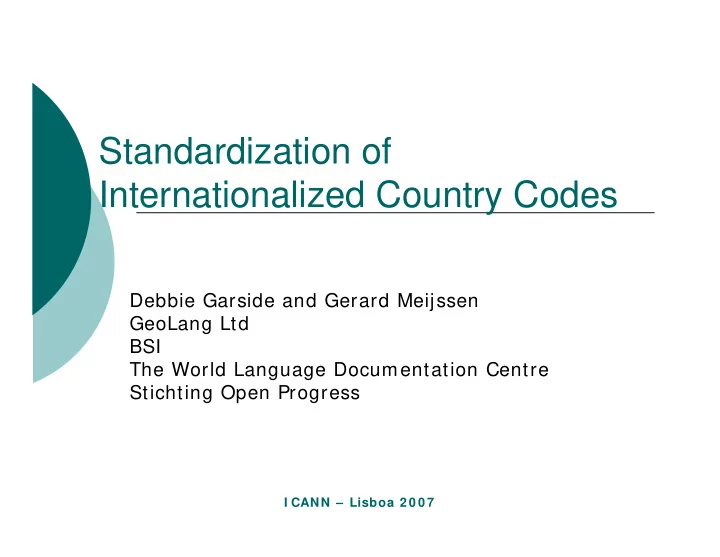

Standardization of Internationalized Country Codes Debbie Garside and Gerard Meijssen GeoLang Ltd BSI The World Language Documentation Centre Stichting Open Progress I CANN – Lisboa 2 0 0 7
Key Questions for Standardization � What is required? � Internationalized Country Codes in the scripts of the world � Who requires it? � Industry, end user communities � When is it required? � Now or as soon as practicable � How should a solution be facilitated? � via a trusted party adopting a process that is inclusive of key stakeholders and end user communities I CANN – Lisboa 2 0 0 7
First Stage In Standardization Process Methodology must include: � mapping to ISO 3166-1 � provision for key stakeholder and end user participation � a method that will take into account similarities between scripts - UNICODE � rules for allocation of standardized codes - conducted on a script by script basis - all Country Codes completed for a script before allocation as standardized codes I CANN – Lisboa 2 0 0 7
Deliverables and Timescales Fast Track Option � Methodology � 2 Months from project inception � Industry Standard Publication (BS/ PAS) � – 6 to 9 Months from project inception � First 3 or 4 scripts piloted and allocated � – 6 to 9 Months from project inception � Publication as ISO DIS � 6 to 9 Months from project inception � Publication as International Standard � 18 to 24 months from project inception � or 6 stage ISO process taking 3-5 years I CANN – Lisboa 2 0 0 7
The Facilitators � GeoLang Ltd � Directors have over 20 years of standardization experience working for both BSI and ISO � BSI � The oldest standardization group in the world � The World Language Documentation Centre � International board made up of 21 experts in fields of linguistics, technology industries, standardization � Stichting Open Progress � Over 5 years experience in operating user led wikis � ISO � International Standards Organisation I CANN – Lisboa 2 0 0 7
An Accepted Standardization Route � ISO 9000 developed as a British Standard initially, adopted by ISO, now most widely used industry standard in the world � Currently The standard for Names and Codes for Oceans and Seas is a French Standard proposed as an ISO by AFNOR � 00XML proposed by ANSI and Microsoft for Fast Track Standardization � Could create an NWIP, BSI happy to facilitate this route, for International Standard but would take 3-5 years before publication – codes would not be stable. I CANN – Lisboa 2 0 0 7
Collaboration is Key Current liaisons sought: � W3C – under discussion � Unicode CLDR – under discussion � ITU – under discussion � IETF – still to respond � MINC – endorses proposal liaison established I CANN – Lisboa 2 0 0 7
Debbie Garside Managing Director – GeoLang Ltd www.geolang.com CEO – The World Language Documentation Centre www.thewldc.org Project Leader and Editor - BSI BS 3166-4 ISO Convenor Gerard Meijssen CEO –Stichting OpenProgress http://openprogress.org Executive Board Member – The World Language Documentation Centre I CANN – Lisboa 2 0 0 7
Recommend
More recommend